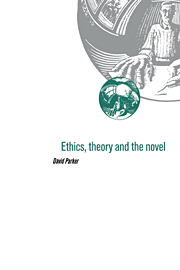Book contents
- Frontmatter
- Contents
- Acknowledgements
- Part I THE ETHICAL UNCONSCIOUS
- Part II SOCIAL BEINGS AND INNOCENTS
- Chapter 6 ‘Bound in Charity’: Middlemarch
- Chapter 7 Forgetting and disorientation in Anna Karenina
- Chapter 8 Two ideas of innocence in The white peacock
- Chapter 9 Into the ideological unknown: Women in love
- Chapter 10 Lawrence and Lady Chatterley: the teller and the tale
- Part III TOWARDS A NEW EVALUATIVE DISCOURSE
- Notes
- Bibliography
- Index
Chapter 6 - ‘Bound in Charity’: Middlemarch
Published online by Cambridge University Press: 05 November 2011
- Frontmatter
- Contents
- Acknowledgements
- Part I THE ETHICAL UNCONSCIOUS
- Part II SOCIAL BEINGS AND INNOCENTS
- Chapter 6 ‘Bound in Charity’: Middlemarch
- Chapter 7 Forgetting and disorientation in Anna Karenina
- Chapter 8 Two ideas of innocence in The white peacock
- Chapter 9 Into the ideological unknown: Women in love
- Chapter 10 Lawrence and Lady Chatterley: the teller and the tale
- Part III TOWARDS A NEW EVALUATIVE DISCOURSE
- Notes
- Bibliography
- Index
Summary
The motto at the head of chapter 42 of Middlemarch is one of those surprises that turn out to be more and more interesting the more you think about them:
How much, methinks, I could despise this man, Were I not bound in charity against it!
(Shakespeare, Henry VIII)As it happens, the speaker in Shakespeare's play is Cardinal Wolsey, and this elegant piece of popish casuistry is aimed at Surrey who is busily trying to relieve him of the great seal of England. But when these lines become the motto of chapter 42, ‘this man’ becomes the Reverend Edward Casaubon, and the whole effect is of an anarchic joke – against George Eliot herself. The moral constraints that apply in the novel itself are being wryly mocked, for George Eliot is firmly committed to doing something much ‘higher’ than despising. The mockery releases the liberating possibility of actually loathing ‘this man’ frankly and to the full – a possibility that corresponds to a gathering need audible in the narrating voice, not to be ‘bound’ in feeling by anything at all. By the middle of the novel, reminders that ‘poor Mr Casaubon’ had a point of view too sound increasingly forced, and scarcely check the vexed undertones of narrative complaint against him. Such feelings, which have no place in the novel's final moral vocabulary, tend in the end to empty that vocabulary of its force. Being bound to it, as George Eliot is, ultimately dries up charity altogether.
- Type
- Chapter
- Information
- Ethics, Theory and the Novel , pp. 77 - 106Publisher: Cambridge University PressPrint publication year: 1994



